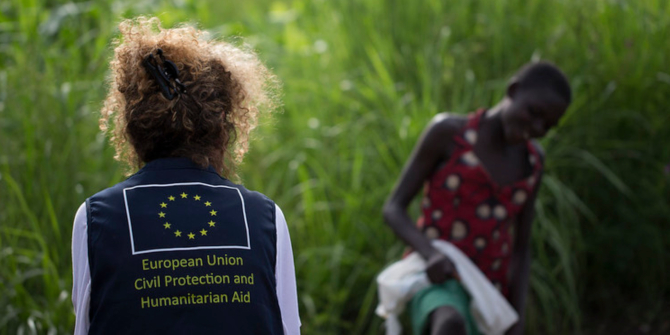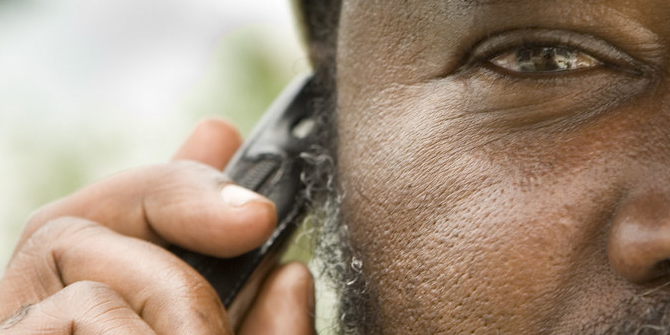In 2018 Uganda held long-awaited elections at the local council level, with the ruling NRM party winning the vast majority of votes. Following the election, Bono Ozunga asks whether current electoral frameworks undermine the democratic mandate, and how they could be reworked to curtail the excesses of state interference.
After 17 year of waiting, 2018 saw one of the most memorable Local Council (LC) elections in Uganda’s history. The majority ruling party, National Resistance Movement (NRM), fielded candidates at lower administrative units, winning over 90 per cent of village and parish leadership positions.
This came after the government endorsed the Local Government Amendment Bill 2014, which changed the system of voting from secret ballot to lining up in public behind candidates of choice. This procedure, the government said, was cheaper compared to the secret ballot system. On the other hand, it was a shrewd system of voting that did not only affect voter turn-out but also compromised the secrecy of votes.
Administration of the elections
Article 61 of the constitution of Uganda establishes the Electoral Commission’s (EC) core mandates: to organise, supervise and conduct regular, free and fair elections. In practice, however, there were several inconsistencies relating to these mandates.
The appointment of Election Officers (EOs) at lower administrative units was highly contested and it is believed that these officers connived with NRM leaders within communities to register mainly NRM supporters. By implication, only these pre-registered voters were allowed to cast a ballot on the day.
Evidence also showed that the Electoral Commission failed to formulate and implement thorough civic education. The call for large-scale civic education relates to high levels of illiteracy among Ugandans, and it is intended to allow voters to know what is expected of them during elections. Consequently, voters believed that since they had already registered under the photographic registration exercise (for Presidential and Parliamentary elections) there was no need to register again for the LC elections.
There were incidences of intimidation and harassment, and the presence of security personnel gave few opportunities for opposition candidates and their supporters to campaign. In Karamoja region, for example, NRM cadres intimidated the community by spreading propaganda that villages would not receive food aid relief from the Office of the Prime Minister unless they voted for NRM candidates.
Moreover, there was no level playing field for political candidates. NRM candidates and their agents handed out money and other essential items to voters. This was contrary to electoral laws that prohibit influencing a person to vote or refrain from voting for certain candidates. Second, local radio FM stations helped convey electoral messages to remote, rural and urban areas. However, most of the radio stations were privately owned and therefore, for fear of their license being revoked, produced biased political news that served the interests of NRM candidates.
Polling day was characterised by delays in the delivery of voting materials, discrepancies in voter registers as well as violence, which consequently led to the premature closure of some polling stations. To date, some of the closed polling stations have still not had elections for their village and parish chairpersons.
In addition, past democratic elections have also demonstrated vast inconsistencies in application of electoral laws, and an unwillingness of the state to accommodate a debate about electoral reforms, including the contested appointment of the Electoral body by the president.
The influence of security personnel during elections
Since early 2000, Uganda’s security forces have been inseparable with politics and, ultimately, elections, for reasons many relate to the expansion of President Yoweri Museveni’s rule in power. Oftentimes, the president has acknowledged that ‘he did not kill a beast for others to enjoy the meat’, which literally means that he is still positioned to enjoy the beast (Uganda) with his fighters. So witnessing the national army participate in active politics is not news but rather a leadership style Museveni uses to justify his hold on power.
The regime has tactfully concentrated power in politically loyal key individuals and departments. For instance, the Special Forces Command (SFC), commanded by Museveni’s first son, Lt General Muhoozi Kainerugaba, is a component of Uganda People’s Defence Forces (UPDF) that carries out specialised missions including guarding the person of the president, state resources and other Very Very Important Persons (VVIPs). Below these army officers are Presidential Assistants, commonly known as Resident District Commissioners (RDC), whose main aim is to protect the interests of the president. These armed groups have, in execution of their duties, exhibited high levels of intolerance to non-loyalists in the public domain, often characterised by the disfranchisement of voters and abuse of democratic principles.
In so doing, the regime has succeeded in demobilising opposition movements seeking change and denying citizens the right to question government policies and practices.
In addition, the regime has introduced strict media regulatory mechanisms that suffocate media freedom and deny citizens the right to vital information. These, the critics say, have only helped to shrink political space and stifle freedom of expression.
Rethinking the electoral mandate
The 2018 village and parish elections were the first of its kind since the reintroduction of multi-party system 17 years earlier. Unlike the jovial mood and excitement during the previous presidential and parliamentary elections, the LC elections had low voter turn-out, inaccurate voter registers, voter bribery, lack of transparency with regard to campaign financing, voter intimidation and many incidences of violence on polling day. Unless the mandate of the Electoral Commission is reviewed, and the excesses of the state reduced, the current electoral frameworks in Uganda shall continue to favour the regime while also eliminating dissenting sentiments.
Photo: Yoweri Kaguta Museveni, President of Uganda, at a signing ceremony with President Kiir of South Sudan in Juba. Credit: UN Photo/Isaac Billy (CC BY-NC-ND 2.0).





